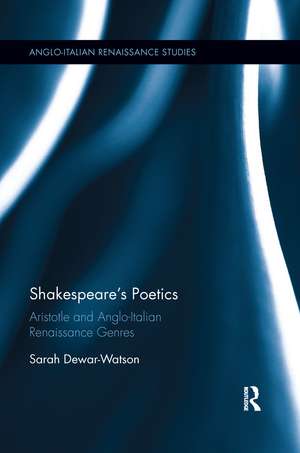Shakespeare's Poetics: Aristotle and Anglo-Italian Renaissance Genres: Anglo-Italian Renaissance Studies
Autor Sarah Dewar-Watsonen Limba Engleză Paperback – 30 sep 2020
| Toate formatele și edițiile | Preț | Express |
|---|---|---|
| Paperback (1) | 257.28 lei 6-8 săpt. | |
| Taylor & Francis – 30 sep 2020 | 257.28 lei 6-8 săpt. | |
| Hardback (1) | 997.11 lei 6-8 săpt. | |
| Taylor & Francis – 21 sep 2017 | 997.11 lei 6-8 săpt. |
Din seria Anglo-Italian Renaissance Studies
- 9%
 Preț: 1037.81 lei
Preț: 1037.81 lei -
 Preț: 153.08 lei
Preț: 153.08 lei -
 Preț: 310.81 lei
Preț: 310.81 lei -
 Preț: 469.34 lei
Preț: 469.34 lei -
 Preț: 434.50 lei
Preț: 434.50 lei - 13%
 Preț: 338.33 lei
Preț: 338.33 lei -
 Preț: 483.55 lei
Preț: 483.55 lei -
 Preț: 469.34 lei
Preț: 469.34 lei -
 Preț: 489.26 lei
Preț: 489.26 lei -
 Preț: 462.85 lei
Preț: 462.85 lei - 16%
 Preț: 261.33 lei
Preț: 261.33 lei -
 Preț: 469.34 lei
Preț: 469.34 lei -
 Preț: 469.34 lei
Preț: 469.34 lei -
 Preț: 389.66 lei
Preț: 389.66 lei - 13%
 Preț: 335.67 lei
Preț: 335.67 lei -
 Preț: 389.38 lei
Preț: 389.38 lei -
 Preț: 406.58 lei
Preț: 406.58 lei -
 Preț: 413.33 lei
Preț: 413.33 lei - 15%
 Preț: 266.61 lei
Preț: 266.61 lei -
 Preț: 382.91 lei
Preț: 382.91 lei -
 Preț: 389.66 lei
Preț: 389.66 lei - 18%
 Preț: 1001.70 lei
Preț: 1001.70 lei - 18%
 Preț: 1114.85 lei
Preț: 1114.85 lei -
 Preț: 401.95 lei
Preț: 401.95 lei - 18%
 Preț: 1116.38 lei
Preț: 1116.38 lei - 18%
 Preț: 1001.87 lei
Preț: 1001.87 lei - 9%
 Preț: 938.18 lei
Preț: 938.18 lei - 18%
 Preț: 999.51 lei
Preț: 999.51 lei
Preț: 257.28 lei
Preț vechi: 310.01 lei
-17% Nou
Puncte Express: 386
Preț estimativ în valută:
49.25€ • 51.39$ • 41.29£
49.25€ • 51.39$ • 41.29£
Carte tipărită la comandă
Livrare economică 13-27 martie
Preluare comenzi: 021 569.72.76
Specificații
ISBN-13: 9780367667504
ISBN-10: 0367667509
Pagini: 172
Dimensiuni: 152 x 229 x 20 mm
Greutate: 0.32 kg
Ediția:1
Editura: Taylor & Francis
Colecția Routledge
Seria Anglo-Italian Renaissance Studies
Locul publicării:Oxford, United Kingdom
ISBN-10: 0367667509
Pagini: 172
Dimensiuni: 152 x 229 x 20 mm
Greutate: 0.32 kg
Ediția:1
Editura: Taylor & Francis
Colecția Routledge
Seria Anglo-Italian Renaissance Studies
Locul publicării:Oxford, United Kingdom
Cuprins
Introduction
1. The Late Plays and their Genre
1.1 The First Folio, Shakespeare and Genre
1.2 Audiences and ‘Dramatic Competence’
1.3 Shakespeare and the Classics
2. Shakespeare and the Reception of the Poetics
2.1 Aristotle’s Poetics: A Brief Reception History
2.2 Cinthio
2.3 Fletcher and Guarini
3. Happy-Ending Tragedy
3.1 Tranquilla ultima
3.2 Tragicomedy: A Hybrid Genre
3.3 The Statue Scene and the Alcestis
4. Wonder and Empathy
4.1 Wonder and Spectacle
4.2 Wonder: Some Contemporary Contexts
4.3 Empathy and Audience Response
5. Shakespeare and Catharsis
5.1 Aristotle and the Critical Background
5.2 Catharsis and the English Stage
5.3 Purgation: Politics, Law, Penance
5.4 Cathartic Endings
6. The Odyssey and Island Romance
6.1 The Odyssey as Tragicomic Model
6.2 Shakespeare and the Odyssey
6.3 Literary Nostalgia and Textual Genealogies
Epilogue
1. The Late Plays and their Genre
1.1 The First Folio, Shakespeare and Genre
1.2 Audiences and ‘Dramatic Competence’
1.3 Shakespeare and the Classics
2. Shakespeare and the Reception of the Poetics
2.1 Aristotle’s Poetics: A Brief Reception History
2.2 Cinthio
2.3 Fletcher and Guarini
3. Happy-Ending Tragedy
3.1 Tranquilla ultima
3.2 Tragicomedy: A Hybrid Genre
3.3 The Statue Scene and the Alcestis
4. Wonder and Empathy
4.1 Wonder and Spectacle
4.2 Wonder: Some Contemporary Contexts
4.3 Empathy and Audience Response
5. Shakespeare and Catharsis
5.1 Aristotle and the Critical Background
5.2 Catharsis and the English Stage
5.3 Purgation: Politics, Law, Penance
5.4 Cathartic Endings
6. The Odyssey and Island Romance
6.1 The Odyssey as Tragicomic Model
6.2 Shakespeare and the Odyssey
6.3 Literary Nostalgia and Textual Genealogies
Epilogue
Notă biografică
Sarah Dewar-Watson is Honorary Research Fellow at the University of Sheffield, UK.
Descriere
The startling central idea behind this study is that the rediscovery of Aristotle's Poetics in the sixteenth century had a profound impact on almost every aspect of Shakespeare's late plays. Re-examining the plays, Dewar-Watson shows how the generic complexity of Shakespeare's late plays is informed by contemporary debates about tragicomedy.
